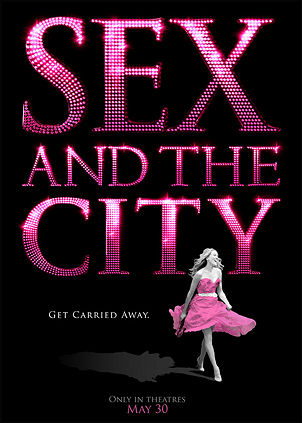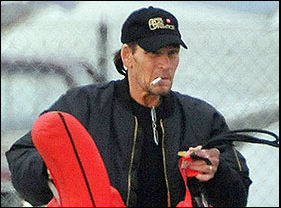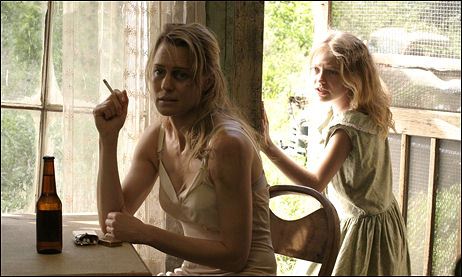I’m presuming HE readers understand that the ’08 Oscar Balloon has its own page now with a feedback/comments option. Should I double up by pasting it at the bottom of the page, where it’s been for three and a hlaf years, or will people adapt to the new click-through deal?
Saturday numbers
HE’s weekend projection for Horton Hears a Who, the animated Dr. Seuss film from 20th Century Fox, is $45,878,000. Roland Emmerich‘s 10,000 B.C. (Warner Bros) will be off 57% from last weekend’s debut for a Sunday-night tally of $15,720,000. Never Back Down (Summit) will wind up with $9,386,000. The repulsively low-grade College Road Trip (Disney) will rake in $8,946,000 for a fourth-place finish. Vantage Point will come in fifth with a $5,592,000 weekend total.
The weekend’s best hold will come from Roger Donaldson‘s The Bank Job, off a mere 21% for a weekend total of $4,679,000 and a $9.600,000 cume. (People obviously like it, arre telling their friends, etc.) Michael Haneke‘s Funny Games (Warner Independent) has opened disastrously with a projected weekend haul of $516,000 at $1700 a print. One might surmise that all those split-decision reviews — a thoughtful first-rate exercise that also ranks as one of the most agonizing films to sit through in human history — had something to do with this, but people don’t read reviews so maybe not.
Cannes ’08 Lineup?
Agence France Press published an article two days ago about the rumors surrounding the ’08 Cannes Film Festival line-up. The confirmed Indiana Jones and The Kingdom of the Crystal Skull and the rumored Sex and The City were mentioned, of course. Both would show out-of-competition like Ocean’s 13 andU2-3D were last year.
The usual Cannes suspects and their new movies were mentioned: Steven Soderbergh‘s The Argentine, Abel Ferrara‘s Chelsea on the Rocks, James Gray‘s Two Lovers, Woody Allen‘s Vicky Cristina Barcelona and Barbet Schroeder‘s Inju.
Also mentioned were some French films — Agnes Jaoui‘s Parlez-Moi de la Pluie, Arnaud Desplechin‘s Un Conte de Noel, Michel Houellebecq‘s La Possibilite d’une ile, Laurent Cantet‘s Entre les Murs and Marina de Van‘s Ne Te Retourne Pas.
The Dardenne Brothers, who won the Palme d’Or twice, might be offering their new film, Le Silence de Lorna, in competition.
Either one of the two legendary Brazilian filmmakers Walter Salles (Linha de Passe) and Fernando Meirelles (Blindness) could have their film in competition. AFP also expects a movie from the one or more of the new generation of Argentinian directors: Lucrecia Martel (La Nna Santa), Pablo Trapero (Leonera) and/or Lisandro Alonso (Liverpool).
“Troubles” In Mind
An interesting Geoffrey Macnab piece in the Independent (dated 3.14) about the best Irish “troubles” films currently viewable on DVD. It includes a chat with Paul Greengrass, who directed one of the very best, Bloody Sunday (’02), which I could never fully understand until the DVD came out with English subtitles.
My favorite Irish conflict fims, in this order: Bloody Sunday, The Informer, The Wind That Shakes the Barley, The Boxer, Michael Collins, Cal, Odd Man Out, The Outsider, A Casualty of War. Two TV movies dealing with this subject/background that I’d very much like to see are Alan Clarke‘s Contact and Elephant.
Lack of a Persuasive Theory
I’m trying to think of a thoughtful, non-prurient reason for running this Alexandra Dupre photo and this link to 20 photos that went up earlier today on the New York Post website, and I can’t think of one. I can’t even think of a comment. Okay, her nose looks a bit smaller.

All I can add is that I’m contributing in a small way to helping AD cash in on her notoriety, and this, in a sense, is a very American, get-along, go-along thing to do. Which may, in the view of this site’s conservative readers, seem to balance out the previous post on a certain capitalistic level.
Wright’s Words Aren’t That Wacko
Necessarily and none too soon, the Rev. Jeremiah Wright‘s inflammatory statements have been repudiated by Sen. Barack Obama. But I can’t help but shake my head about the most assaultive sermon Wright ever gave — the one that’s gotten loads of airplay today — about how U.S. foreign policy essentially invited the 9.11 attacks. Because what he said was pretty close to the truth.
If you ask me the most alarming thing about this six-and-a-half year old videotape is Wright’s delivery. He says that God waved the attacks on, and seems to be almost relishing the fact that this country suffered what he considered an unsurprising retaliation for various foreign-policy provocations over the last few decades.
But tone down the emotion and the rhetoric and the words aren’t that different than those written by Gore Vidal (“Perpetual War for Perpetual Peace: How We Got To Be So Hated“), Noam Chomsky (“9-11“) and Chalmers Johnson (“Blowback: The Costs and Consequences of American Empire“). These three guys and many others have said the same thing, which is that our government has been behind aggressive rogue policies directed against many nationalistic movements over many decades, and that it’s not a surprise that this (along with U.S. economic hegemony) resulted in a stateside attack
The conservative talkbackers who regularly respond to stories on this site will probably claim that Vidal, Chomsky and Johnson are unreliable kooks. Well, they’re not. Anyone with a comprehensive understanding of this country’s history of rogue or covert attacks upon nationalistic movements that have been construed to be in opposition to U.S. allies or economic interests is well known.
Of course, this view has never been tolerated in the mainstream media. If you’re unwise enough to say it you’ll get shouted down or shunned. Maggie Gyllenhaal got into trouble in ’05 for saying the U.S. was responsible in some way for the 9.11 attacks. Bill Maher lost his late-night talk show for simply saying the 9.11 attackers, however despicable their acts, weren’t cowards.
There’s one view of 9.11 that is tolerated in this country, and that’s that the devil himself rose up from hell and murdered almost 3,000 people for no reason other than to perpetuate pure evil. There’s no debating it. Either you buy into the party line, or you don’t and you suffer. But sooner or later people in this country are going to have to pull their heads out of the sand.
Name the source
10 or 12 seconds of music, all strings, two notes, no melody. I’m figuring people know the movie it’s from anyway. It’s got a very strong vibe. Obviously not a comedy.
Sex in the City in Cannes?
For the sake of its own dignity, the Cannes Film Festival should impose limits upon itself in terms of providing a forum for questionable, possibly tacky films to make a pre-release splash. I know very little about the upcoming Sex and the City movie, but my first reaction to reading Elizabeth Snead‘s 3.14 Envelope story that the 5.30 New Line release might make its worldwide debut in Cannes was “oh, no…bad idea.”

Snead quoted Sarah Jessica Parker ( a.k.a., Carrie Bradshaw) as saying “we are all still figuring out what we want in terms of the movie…whether it’s at Cannes two weeks before it opens domestically…it will all shake down in the next week or so.”
Speaking at Showest, Parker told Snead that “a handful of people have seen it and have been very surprised by the seriousness [of the film]…there’s something that happens in this movie and it’s really about realizing your own complicity and disappointment…you know the necessity of friends, but at a certain point, as a grown-up person, you have to take care of yourself. There’s still plenty of ripe old salty dirty stuff. But I think it’s a really smart story and I think Michael Patrick wrote a beautiful screenplay. I feel like he wrote the role of a lifetime for me and it was just such an amazing experience.”
It won’t be a “tragedy” if Sex and the City goes to Cannes. Indiana Jones and the Kingdom of the Crystal Skull is being shown there, after all. The festival screened Ocean’s 13 last year, and Brett Ratner‘s X-Men 3: The Last Stand and The DaVinci Code the year before. Still, Sex in the City at Cannes would drop the prestige levels by a notch or two. C’mon…you know it would. Nothing dramatic or devastating, but it would be seen as sliding a little bit closer to the swamp.

VanAirsdale off to Defamer
Congrats to The Reeler’s Stu VanAirsdale for landing a full-time gig with Defamer. It will begin on March 17. I’m predicting that within six months VanAirsdale will have to go to the dentist for cosmetic dentures due to having ground at least a centimeter off his smile teeth. I flirted with some kind of limited Defamer contributor status in late January (I liked the idea of growing HE’s audience), but a little voice kept telling me, “Do this and you’ll die.”
Nothing to lose
If you’re on the ropes with a life-threatening illness and it doesn’t look good, what difference does it make if you have a cigarette? It’s a tough situation, but if I was Patrick Swayze‘s best friend and he pulled out a smoke and lit up, I’d shake my head but my main attitude would be, “Whatever, man.”

My father’s doing better than Swayze but he’s not in the best of shape either. Bed-ridden, gaunt, stuck in a hospital room. The kids and I paid him a visit last December. He asked to bum a cigarette at one point. I thought about it for two or three seconds and figured where’s the harm at this stage of the game? I told him I don’t smoke but that his grandson Dylan does and that I’d ask. Dylan, 18, visited him a few minutes later and slipped him a butt and a match.
Of course, the only way to sneak a cigarette in a hospital ward is to go outside so the nurses won’t smell it. Except my dad can’t move without someone pushing him in a wheelchair so I knew there’d be trouble. Sure enough, he lit up and a nurse came in almost immediately and gave him hell. My father, a real stand-up guy, said, “It wasn’t my fault entirely…my grandson gave me the cigarette!” The angry nurse found Dylan playing pool in a nearby rec room and grilled him about this. Dylan stood his ground and said he didn’t know what she was on about.
The time not to smoke is when you’re healthy and want to stay that way. But if your goose is more or less cooked, pick your poison and be at peace.
Hounddog finally adopted
After wandering barefoot in the woods for over a year, Deborah Kampmeier‘s Hounddog, which everyone (and I mean everyone) dissed at Sundance ’07, has finally been acquired for theatrical distribution. The sucker, according to N.Y. Post critic/blogger Lou Lumenick, is Empire Pictures, which plans to open the southern gothic drama in “more than 500” theaters on 7.18.

Robin Wright Penn, Dakota Fanning
If any movie ever had the words “straight to DVD” tattooed on its forehead, it’s this one. Why could Empire be thinking? Is this a tax writedown?
I wrote the following about Hounddog roughly 14 months ago: “I agree with everyone else that it’s nothing. Nothing to see, nothing to release, nothing to rent, nothing to get shocked or stirred about…just another neo-Faulknerian Southern gothic wallow with a tasteful, non-inflammatory Dakota Fanning rape scene.” Robin Wright Penn (has she dropped the last name?) costars as Fanning’s mom.
I added, however, that Fanning “is a very skilled, super-readable scene inhabitor. That may have been obvious to others previously, but this is the first film she’s had to carry as the star.”
Here‘s what Variety‘s Todd McCarthy had to say


